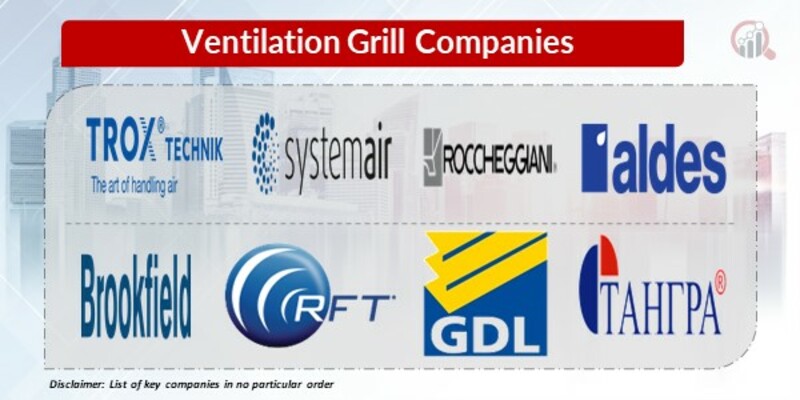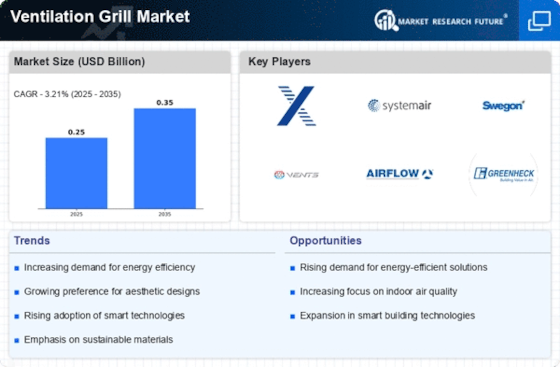Top Industry Leaders in the Ventilation Grill Market
 The ventilation grill market, a seemingly inconspicuous segment within the broader construction industry, holds significant importance in ensuring healthy and comfortable indoor environments. While often overlooked, these humble grilles play a crucial role in regulating airflow, preventing moisture buildup, and filtering out pollutants. driven by rising urbanization, increasing awareness of indoor air quality (IAQ), and stringent regulations.
The ventilation grill market, a seemingly inconspicuous segment within the broader construction industry, holds significant importance in ensuring healthy and comfortable indoor environments. While often overlooked, these humble grilles play a crucial role in regulating airflow, preventing moisture buildup, and filtering out pollutants. driven by rising urbanization, increasing awareness of indoor air quality (IAQ), and stringent regulations.
Strategies:
-
Product Innovation: Leading brands are constantly innovating, developing energy-efficient grilles with noise-reduction capabilities, smart controls, and integration with building automation systems. Trox Group's Silentflow series and Fläkt Woods' Airmaster XQ exemplify this focus on advanced features. -
Material Differentiation: Manufacturers are exploring alternative materials like sustainable wood composites and recycled plastic to cater to environmentally conscious consumers. USG Corp.'s USG Durovent® grilles made from recycled plastic bottles are a prime example. -
Focus on Specific Segments: Some players specialize in catering to specific segments like residential, commercial, or industrial buildings. Titus, for instance, offers a wide range of grilles for hotels and hospitals, while Fläkt Woods focuses on industrial ventilation applications. -
Geographical Expansion: Established brands are actively expanding into emerging markets like Asia-Pacific and Latin America, where construction activity is booming. Trox Group's recent acquisition of Singapore-based Airius strengthens its presence in Southeast Asia. -
Sustainability Initiatives: Manufacturers are increasingly incorporating sustainable practices into their operations and product offerings. USG Corp.'s LEED-certified grilles and Fläkt Woods' energy-efficient designs are testaments to this commitment.
Market Share Determinants:
-
Brand Reputation: Established brands with a proven track record of quality and reliability often command higher market share. -
Product Portfolio Breadth: Offering a diverse range of grilles for various applications and price points caters to a broader customer base. -
Distribution Network Strength: Having a strong distribution network ensures easy access for customers and faster delivery times. -
Technical Expertise: Expertise in ventilation systems and airflow dynamics is crucial for designing effective grilles. -
Compliance with Regulations: Meeting stringent building codes and IAQ standards is essential for market acceptance.
Key Players
- Trox GmbH (Germany)
- Systemair AB (Sweden)
- Imeksan HVAC (Turkey)
- Roccheggiani SpA (Italy)
- Aldes Aeraulique S.A., (France)
- Brookfield, WI (US)
- Rf-Technologies NV/SA (Belgium)
- Vents (Ukraine)
- GDL Air Systems Limited (UK)
- TANGRA AV Ltd (Bulgaria)
- Gavo B.V. (the Netherlands)
- Allvent (Australia)
- Kemtron (UK)
- Waterloo Air Products Plc. (UK)
Recent Developments :
September 2023: The International Organization for Standardization (ISO) releases a new standard for ventilation grille performance, raising the bar for quality and efficiency.
October 2023: A research study by Harvard University highlights the link between poor indoor air quality and cognitive decline, boosting awareness of IAQ and the importance of effective ventilation.
November 2023: Several countries, including China and Japan, announce plans for large-scale infrastructure projects, driving demand for ventilation systems and grilles.
December 2023: The global supply chain disruptions caused by the pandemic ease, leading to improved availability of raw materials and increased production capacity for ventilation grilles.










